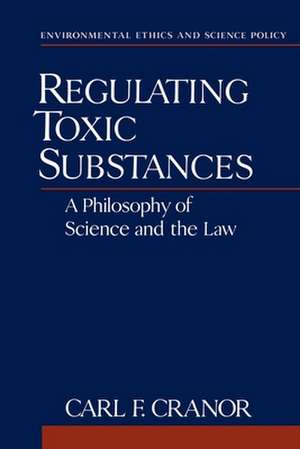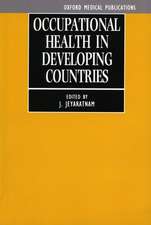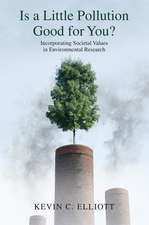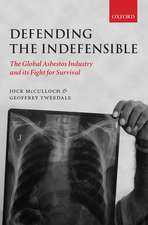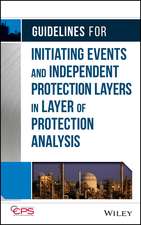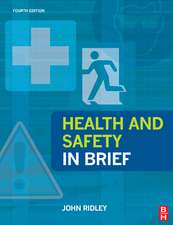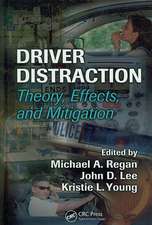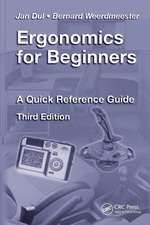Regulating Toxic Substances: A Philosophy of Science and the Law: Environmental Ethics and Science Policy Series
Autor Carl F. Cranoren Limba Engleză Paperback – 9 oct 1997
| Toate formatele și edițiile | Preț | Express |
|---|---|---|
| Paperback (1) | 490.16 lei 31-37 zile | |
| Oxford University Press – 9 oct 1997 | 490.16 lei 31-37 zile | |
| Hardback (1) | 246.61 lei 31-37 zile | |
| Oxford University Press – 20 mai 1993 | 246.61 lei 31-37 zile |
Din seria Environmental Ethics and Science Policy Series
- 30%
 Preț: 613.05 lei
Preț: 613.05 lei - 22%
 Preț: 164.85 lei
Preț: 164.85 lei -
 Preț: 325.36 lei
Preț: 325.36 lei - 13%
 Preț: 164.68 lei
Preț: 164.68 lei - 30%
 Preț: 499.28 lei
Preț: 499.28 lei - 23%
 Preț: 246.61 lei
Preț: 246.61 lei - 34%
 Preț: 1199.87 lei
Preț: 1199.87 lei - 30%
 Preț: 657.79 lei
Preț: 657.79 lei - 19%
 Preț: 497.41 lei
Preț: 497.41 lei - 13%
 Preț: 225.79 lei
Preț: 225.79 lei - 22%
 Preț: 551.92 lei
Preț: 551.92 lei - 8%
 Preț: 263.66 lei
Preț: 263.66 lei - 10%
 Preț: 276.30 lei
Preț: 276.30 lei - 12%
 Preț: 334.22 lei
Preț: 334.22 lei - 12%
 Preț: 241.54 lei
Preț: 241.54 lei
Preț: 490.16 lei
Preț vechi: 604.92 lei
-19% Nou
Puncte Express: 735
Preț estimativ în valută:
93.80€ • 97.57$ • 77.44£
93.80€ • 97.57$ • 77.44£
Carte tipărită la comandă
Livrare economică 04-10 aprilie
Preluare comenzi: 021 569.72.76
Specificații
ISBN-13: 9780195113785
ISBN-10: 0195113780
Pagini: 272
Ilustrații: line figures
Dimensiuni: 155 x 234 x 20 mm
Greutate: 0.41 kg
Ediția:Revised
Editura: Oxford University Press
Colecția OUP USA
Seria Environmental Ethics and Science Policy Series
Locul publicării:New York, United States
ISBN-10: 0195113780
Pagini: 272
Ilustrații: line figures
Dimensiuni: 155 x 234 x 20 mm
Greutate: 0.41 kg
Ediția:Revised
Editura: Oxford University Press
Colecția OUP USA
Seria Environmental Ethics and Science Policy Series
Locul publicării:New York, United States
Recenzii
will usefully introduce ... philosophically unsophisticated readers to some key normative and epistemological issues in environmental policy ... and will usefully introduce philosophical readers to both empirical and philosophical problems and issues in regulatory science". David Copp, University of California
The arguments it contains are important and original and should be heard
The arguments it contains are important and original and should be heard
